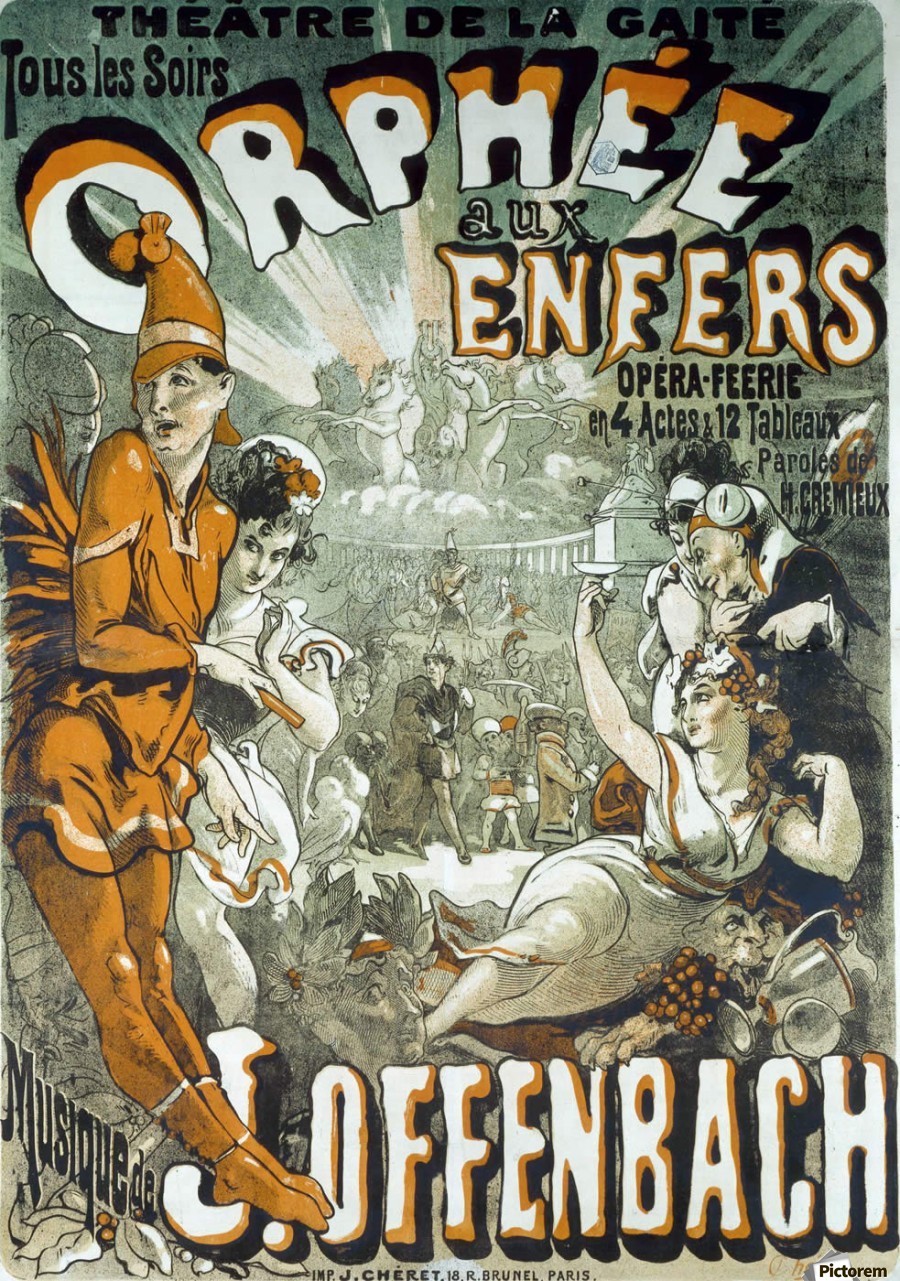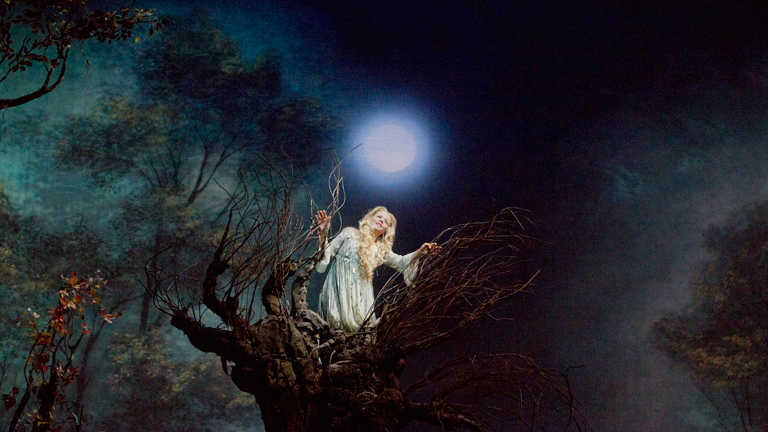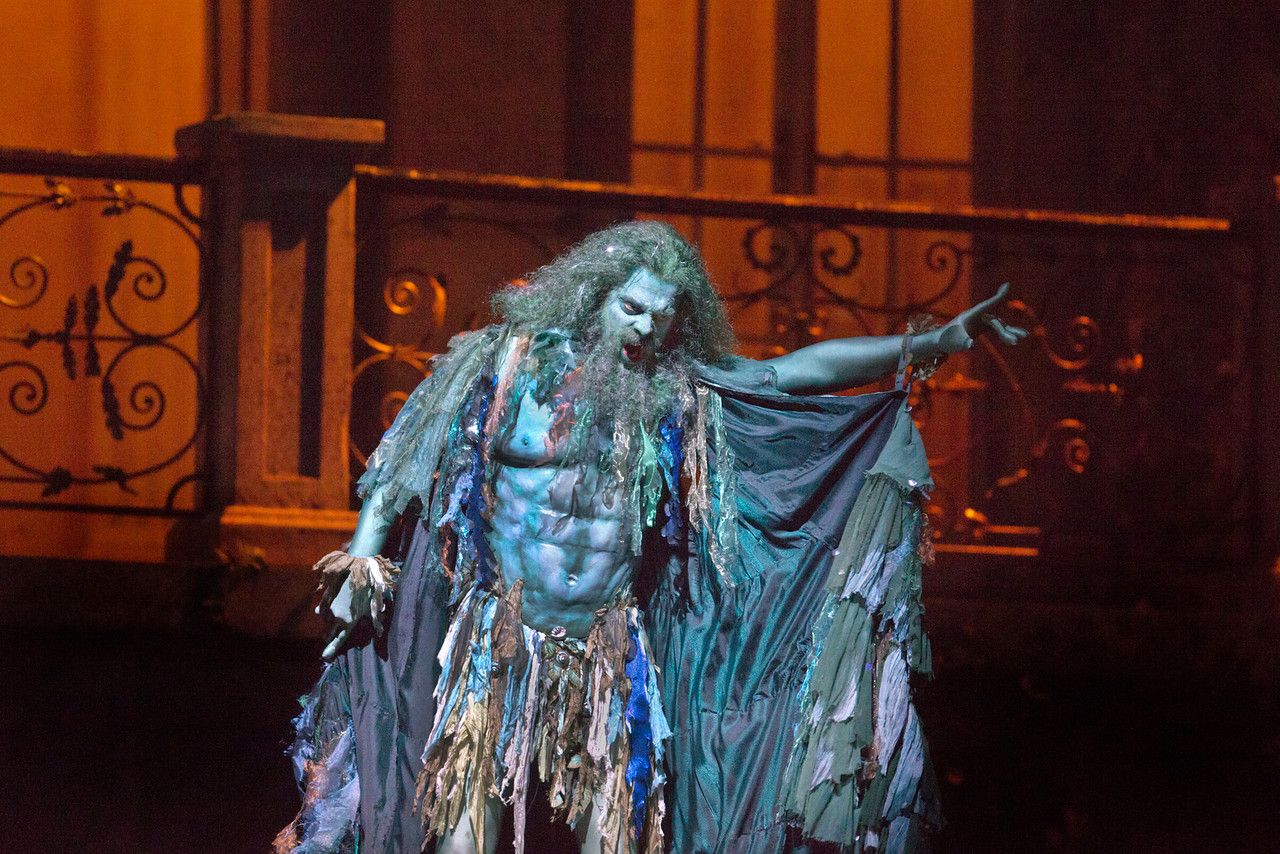|
Saturdee
Opry Links # 114: Krazy Kar Edition!
Women in pants! A giant
talking fly! Fake Italian arias! (Well, one.) Water Nymphs! The Pointer Sisters!
Mario Lanza! Yes, it's Saturdee Opry Links' Krazy Kar Edition! You never know
which way it will swerve!
 
Hey, Orpheus, get outta that underworld!
Renee Fleming as "Rusalka"

Now that's make-up: John Relyea as the Water Gnome in “Rusalka.”
Saturdee Opry Links Overture:
Offenbach, "Orpheus in the Underworld."
https://www.youtube.com/watch?v=vEnW5_GTooI
1.
Okay, kids, SOL starts with something diametrically opposed to everything
happening today in human society today. Eh? What? Why. . .I'm talking about
beauty, of course. In this case, ethereal beauty, in the form of the closing
trio from "Der Rosenkavalier" ("the Rose Bearer") by Richard Strauss. This comic
opera is about aging gracefully and sacrifice, two concepts largely alien to
American culture. The story? Well, it's like this, see. . .this young guy,
Octavian (played by a mezzo in pants) is making it with an older broad, who goes
by the semi-royal title of "The Marschallin." But. . .Octavian falls in love
with cutie-pie Sophie, who is somehow promised to the flatulent old fop, Baron
Ochs. So. . .Octavian, Sophie, AND the Marschallin conspire to free Sophie from
the Baron, in order that she may marry Octavian. Got it? Me,neither. So in this
trio, they all sing about their feelings over this oddly beautiful series of
events: The Marschallin regrets that it happened so fast, as she must say
goodbye to Octavian, and illusions of being young. . .Sophie is awe-struck by
the Marschallin's kindness. . .Octavian feels guilty and confused.
Here is the powerhouse trio of Renee Fleming (Marschallin) Kathleen Battle
(Sophie), and Frederica Von Stade (Octavian.)
https://www.youtube.com/watch?v=wp94vrI_-oY
Translation:
(Search for "I promised," and start there.)
https://www.opera-arias.com/strauss-r/der-rosenkavalier/libretto/english/
SOL EXTRA: WHAT MAKES THE TRIO SO REMARKABLE?
The Marschallin’s seamless lyrical phrases illustrate her nobility and
thoughtfulness; Sophie’s soaring silvery voice reveals her innocent idealism;
while Strauss conveys Octavian’s impetuosity and passion through quicker,
shorter phrases, rising in pitch as his emotions intensify.
https://www.roh.org.uk/news/der-rosenkavalier-musical-highlight-hab-mirs-gelobt
2.
Okay, in act two of R. Strauss's 1911 opera, "Der Rosenkavalier" (see opry link
# 1 for plot), we come to the part about the rose. Right, the big payoff that
gives the opera its name. Now, it's more deliciously complicated than this, but
basically, the gloopy old Baron approves of Octavian presenting a silver rose to
cutey-pie Sophie---who is promised to the Old Gloop---on his behalf.
But---zounds!---Octavian gets one look at Sophie, and Sophie gets one look at
Octavian, and. . .hormones! I mean love! If you imagine that confusion and
hijinks ensue, you are coming to understand opera better all the time. This is
the tender, almost impossibly beautiful "Presentation of the Rose" sequence.
Remember, Octavian, who has testicles, is her sung by a mezzo-soprano (usually
lacking in same) wearing pants. (Done for musical reasons, essentially.) This is
the late Lucia Popp and Brigette Fassbaender (Octavian.) Listen to the magical
woodwinds!
https://www.youtube.com/watch?v=vuYNilYrF3Q
Translation:
https://lyricstranslate.com/en/mir-ist-die-ehre-widerfahren-i-have-been-given-honor.html
SOL EXTRA:
What is a "breeches" (or "trouser") role? Why are those ladies playing men?
https://en.wikipedia.org/wiki/Breeches_role
3.
Now how and why is there a great, Puccini-esque Italian aria in the middle of a
German comic opera? Unlike much that is happening in the remains of our country
today, there is a logical explanation! In R. Strauss's "Der Rosenkavalier" ("The
Rose Bearer"---see previous two links) The Marschallin throws a party, see, and
invites a "prominent Italian tenor" to entertain. Simple. So Strauss tapped the
Italian part of his brain (he did write a nice tone poem called "Aus Italian")
and came up with a dandy love aria. So dandy, in fact, that it has become part
of standard Italian aria repertory! (Makes you wish Strauss had done an entire
opera in the vein of Puccini.) And we bring you two "prominent Italian tenors"
here, with "Di Rigori Armato." (By the way, it's a fun way for great tenors do
to cameos.)
Setting : The boudoir of Princess Werdenburg of Vienna
Synopsis : A busy reception scene ensues as the room fills with vendors and
supplicants to the Marschallin ("Drei arme adelige Waisen"), who ignores the
former and aids the latter. A tenor sent by the Portuguese ambassador serenades
her ("Di rigori armato.”)
Here is a recording by Mario Lanza, with translation below:
https://www.mariolanzatenor.com/di-rigori-armato.html
And with the great Pavarotti:
https://www.youtube.com/watch?v=M-UQt5HXWnQ
4.
Well, one good short Italian aria demands another good short Italian aria, but
that's too obvious, so I'm not going to do it. Here instead is a monkey-wrench
in the works, a left turn, what Zappa used to call an AAAFANRAA (look it up.)
This is the act two bass-baritone aria by Vodnik, the Water-Goblin, from
Dvorak's enchanting opera "Rusalka." Czech it out. (Badda, no bing.) It's called
"Cely svet neda ti," and no, I don't know how to pronounce it. But it is
gorgeous, moving, and full of slavic brooding. The plot? Poor Rusalka, the
water-nymph, longed to be human in order to experience love. A witch offered her
a way, but with a catch: she would be mute, in the world of humans. So
enthralled with the idea of love is Rusalka, that she accepts, and is soon
carried away, literally and figuratively, by a prince. As you might guess, not
being able to speak is a bit of a handicap, and the prince rejects her. While
she is weeping in his garden, alone, during a soiree in the prince's castle one
night, her father, Vodnik, the water-gnome, rises from a pond and expresses his
great sorrow at her misfortune, urging her to persevere. The aria is "Cely svet
neda ti." Translation below:
The baritone is Jongming Park.
https://www.youtube.com/watch?v=xfuh3lk1bsg
Translation:
"Alas! Alas!
Poor Rusalko pale,
in the splendor of the world cursed!
Alas!
The whole world will not give you, will not,
the water the empire is blossoming in!
You would be a hundred times
in the yoke you are bound by the ages.
Even if one loved you a hundred times,
you can't attract him forever!
Poor Rusalko pale,
Captured in the magic of human ties!
Your water seeks you everywhere,
in vain he wants to hug you!
When you return to your mate,
you will only be a deadly element,
you will come back to life withered,
You curse the elements!
Poor Rusalko pale,
in the splendor of the world cursed!"
5.
Dvorak wrote ten operas, but only one is performed today---"Rusalka." It was the
last one he wrote, premiered shortly before his death. The opera was
rediscovered and revived in the mid-70's, and achieved widespread popularity
with Renee Fleming in the lead role. Coincidence? I think not! Dvorak was no
Puccini, but he did manage this nice little tenor aria, "Vidino Divna," sung
when the prince encounters the water nymph, Rusalka, and is smitten. Who
wouldn't be? The tenor is Piotr Beczala.
https://www.youtube.com/watch?v=4sATFsQTVTI
And how it can look on stage (aria begins at 5:06.)
https://www.youtube.com/watch?v=01aNnTSp1W8
TRANSLATION:
Beautiful vision, delightful.
Are you a woman or a fairy tale?
Want you to protect that precious game
Which I have just seen in the forest?
Are you come to beg her life,
You and the doe are kindred blood?
Or do you yourself, coming to me,
Intend to be the hunter's trophy?
Unable to speak, Rusalka stretches out her hands towards him.
THE PRINCE
Secrets, perhaps, have closed your lips
Or are you for ever mute?
If mute are your lips, I swear to God,
They will answer to my kiss!
Explain the mysteries that have allured me here,
That have been calling me over thorns, over rocks,
So that I finally on this blissful day
Could feel the enchantment of your lovely regard!
What is there hidden in your heart.
If you do love me, tell it me.
If you do love me, tell it me!
Translation:
Beautiful vision, delightful.
Are you a woman or a fairy?tale?
Want you to protect that precious game
Which I have just seen in the forest?
Are you come to beg her life,
You and the doe are kindred blood?
Or do you yourself, coming to me,
Intend to be the hunter's trophy?
(Still unable to speak, Rusalka again stretches out her hands towards him.)
THE PRINCE:
Secrets, perhaps, have closed your lips
Or are you for ever mute?
If mute are your lips, I swear to God,
They will answer to my kiss!
Explain the mysteries that have allured me here,
That have been calling me over thorns, over rocks,
So that I finally on this blissful day
Could feel the enchantment of your lovely regard!
What is there hidden in your heart.
If you do love me, tell it me.
If you do love me, tell it me
(She leaps into his arms.)
6.
Be careful what you wish for. Rusalka, the water nymph, longs to trade her
beautiful lake, forest, sisters, and water-gnome father for human love. She
makes a deal with the witch, Oprah---I mean Ježibaba---to take human form---on
the condition that she must remain mute. If she does not persuade a human to
love her, she must return to the water---forever exiled, alone---and she must
lure the man she loved to his death. You know, a good, old-fashioned fairy tale,
full of horror. This opera, by Dvorak, was forgotten after its successful
premiere in 1901, but was revived in the mid-70's with one Gabriela Beňačková in
the lead role. Young Renee Fleming saw this production, and adopted the opera,
more or less---very much basing her portrayal on Beňačková's. Fleming, who won
the Met Auditions at the late age of 29 with the "Song to the Moon" aria from
the opera, went on to make it her signature role---essentially bringing the
opera back to standard repertory. Here she is in a performance of the aria from
later in her career. (Dvorak, in my opinion, worked incredibly hard to write a
Puccini-esque soprano piece, and succeeded.)
https://www.youtube.com/watch?v=YXHbSBwOXiI
Translation:
Moon in the deep sky,
I see your light far away.
You wander the world wide,
You look in people's dwellings.
You wander the world wide,
You look in people's dwellings.
Moonlight, hang on a second,
tell me,
Where is my dear.
Moonlight, hang on a second,
Tell me, tell me
Where is my dear.
Tell him, silver moonlight,
My embrace him,
Make at least a moment
He remembered me dreaming
Make at least a moment
He remembered me dreaming.
To shine him far,
Initiate,
Tell him, tell him
Who's waiting for him.
To shine him far,
Initiate,
Tell him, tell him
Who's waiting for him.
About me, the human soul dreams,
Let him wake up with that memory.
Don't turn off the moon! Don't go out!
Don't turn off the moon!
7.
Cartoon time! From "Opera Imaginaire," here is a goofy, fun animated sequence
accompanying "Voi che sapete," from Mozart's "The Marriage of Figaro." You know
the aria, and you do remember fun, right? "You who know what love is."
Role: Cherubino, a young page in the Count's service
Setting: The Countess's bedroom
Synopsis: After Cherubino arrives in his new military uniform, he sings a plea
to women to see how much love he has to give. You know, like Barry White.
Translation:
http://www.aria-database.com/translations/nozze11_voi.txt
https://www.youtube.com/watch?v=_vjYKHPkZI0&list=PLDrywYgqkDxfZ-XPHTnwVXyNLsVLSLJzt&index=4
8.
Lots of buzz about this sequence. . .Help me! Help me! (Hint, hint.)
Because we opened with Offenbach's comic opera overture, "Orpheus in the
Underworld," here is a sequence from same. I much prefer it to composer Mathew
Aucoin's recent wildly intellectualized telling of the legend. With English
subtitles.
Synopsis:
Eurydice is being kept locked up by Pluton, and is finding life very tedious.
Her jailer is a dull-witted tippler by the name of John Styx. Jupiter discovers
where Pluton has hidden Eurydice, and slips through the keyhole by turning into
a beautiful, golden fly! Help me! Help me! He meets Eurydice on the other side,
and sings a love duet with her where his part consists entirely of buzzing ("Duo
de la mouche"). Afterwards, he reveals himself to her, and promises to help her,
largely because he wants her for himself. Pluton is left furiously berating John
Styx.
https://www.youtube.com/watch?v=XzG4B8GiWKc
And of course, Lassie:
https://www.youtube.com/watch?v=Up6g0SDMJ7A
9.
Okay, a few links ago, I was threatening to follow up the short R. Strauss
mock-Italian-love-aria with a real Italian love aria, also short, but vetoed the
idea for predictability. Now, to surprise you. . .here is the world's shortest
great Italian aria, or the world's greatest short Italian aria (as I always
say.) Can't let SOL go by without some genuine Italian heart. From "Fedora," by
Giordano, here is "Amor Ti Vieta." With the ridiculously maligned great tenor
and great man, Placido Domingo.
Setting: a party at Fedora's house, Paris, France, late 19th century
Synopsis: Fedora has found out that Count Loris killed her fiance and swears to
avenge his death. As the first step in her plan to capture Loris, she goes to
Paris and attempts to get him to fall in love with her. Later, they are at a
party at Fedora's house and he tells her that he truly loves her.
https://www.youtube.com/watch?v=5nDrBKUdbeY
Translation:
http://www.aria-database.com/search.php?individualAria=1123
FINAL BOW:
Come in with a splash, go out with a splash. From Orpheus to. . .Orpheus. Think
I can't? I'm sure I can-can. Ain't gods the funniest bunch of clowns ever?
(Followed closely by Republicans.) With English subtitles.
Synopsis:
On the banks of the Styx, Pluto is giving a party for the gods, and Jupiter has
brought Eurydice in disguise. Pluto soon discovers her identity. Bowing to
Public Opinion, Jupiter declares that Orpheus must at least try to take Eurydice
home, but he must do so without looking back. Orpheus fails the test when
Jupiter throws a lightning bolt and startles him into turning around. Thus is
Orpheus freed of Eurydice. Jupiter ultimately hands Eurydice off to Bacchus as
another ornament for his wine-tinged revels. Only Public Opinion finds this an
unsatisfactory conclusion. All others break into a concluding cancan. And why
the hell shouldn't they? I'm thinking of breaking into a concluding can-can,
myself.
https://www.youtube.com/watch?v=grtFa34EdgI
And of course, Lassie:
https://www.youtube.com/watch?v=FVxv6AFt7YM
ENCORE!
Speaking of can-can.
https://www.youtube.com/watch?v=-FKHG15J0xI
Back to Opera Links
Back to Home Page
|



